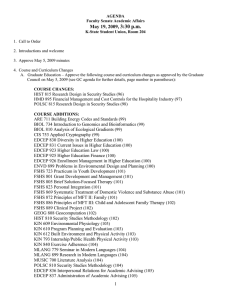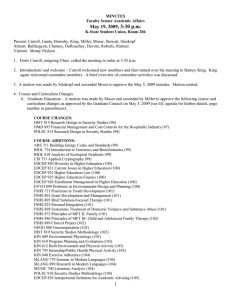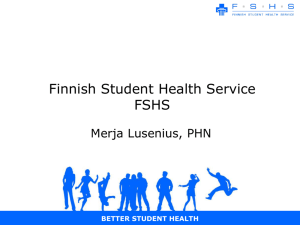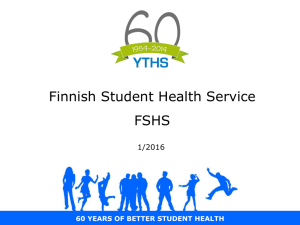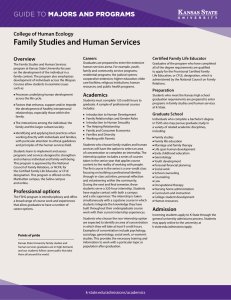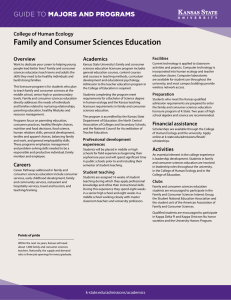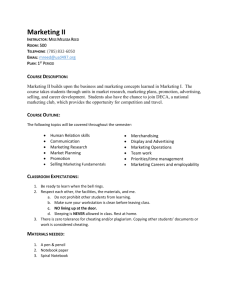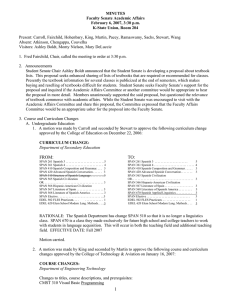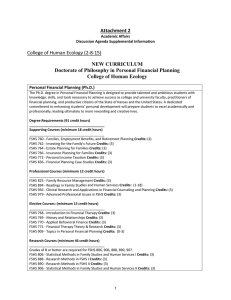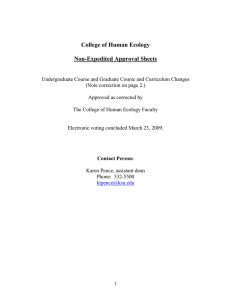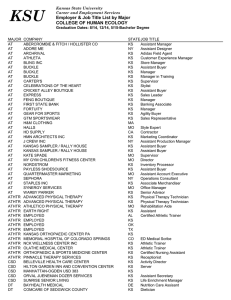Guide to majors and programs Family Studies and Human Services Overview
advertisement
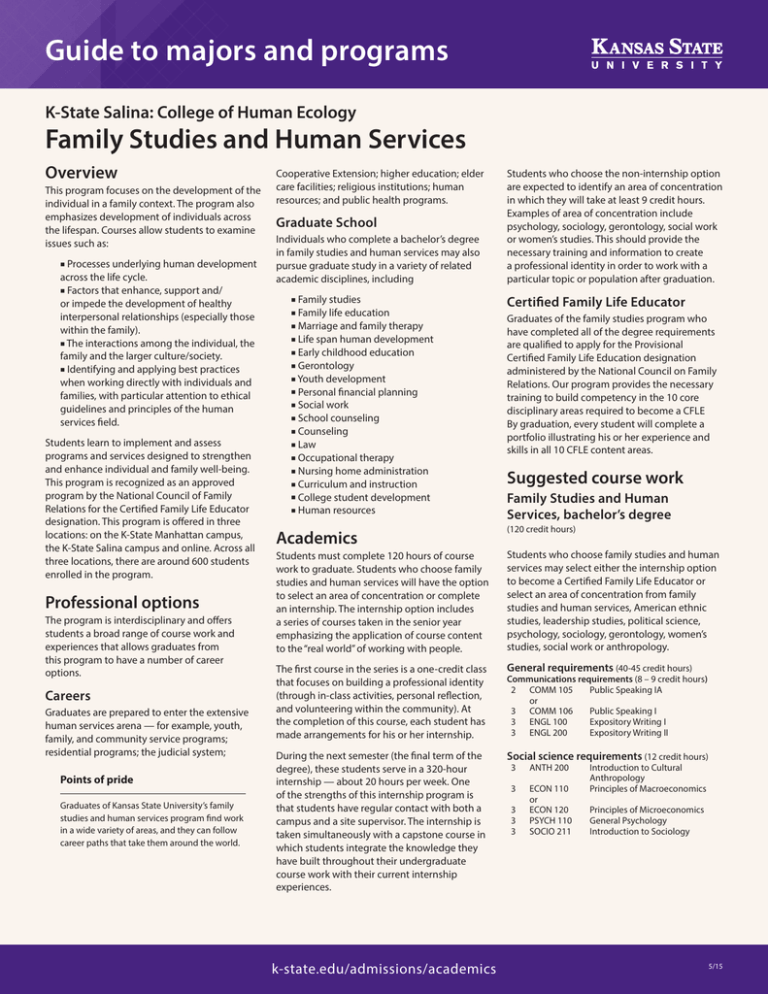
Guide to majors and programs K-State Salina: College of Human Ecology Family Studies and Human Services Overview This program focuses on the development of the individual in a family context. The program also emphasizes development of individuals across the lifespan. Courses allow students to examine issues such as: Processes underlying human development across the life cycle. n Factors that enhance, support and/ or impede the development of healthy interpersonal relationships (especially those within the family). n The interactions among the individual, the family and the larger culture/society. n Identifying and applying best practices when working directly with individuals and families, with particular attention to ethical guidelines and principles of the human services field. n Students learn to implement and assess programs and services designed to strengthen and enhance individual and family well-being. This program is recognized as an approved program by the National Council of Family Relations for the Certified Family Life Educator designation. This program is offered in three locations: on the K-State Manhattan campus, the K-State Salina campus and online. Across all three locations, there are around 600 students enrolled in the program. Professional options The program is interdisciplinary and offers students a broad range of course work and experiences that allows graduates from this program to have a number of career options. Careers Graduates are prepared to enter the extensive human services arena — for example, youth, family, and community service programs; residential programs; the judicial system; Points of pride Graduates of Kansas State University’s family studies and human services program find work in a wide variety of areas, and they can follow career paths that take them around the world. Cooperative Extension; higher education; elder care facilities; religious institutions; human resources; and public health programs. Graduate School Individuals who complete a bachelor’s degree in family studies and human services may also pursue graduate study in a variety of related academic disciplines, including Family studies Family life education n Marriage and family therapy n Life span human development n Early childhood education n Gerontology n Youth development n Personal financial planning n Social work n School counseling n Counseling n Law n Occupational therapy n Nursing home administration n Curriculum and instruction n College student development n Human resources n n Academics Students who choose the non-internship option are expected to identify an area of concentration in which they will take at least 9 credit hours. Examples of area of concentration include psychology, sociology, gerontology, social work or women’s studies. This should provide the necessary training and information to create a professional identity in order to work with a particular topic or population after graduation. Certified Family Life Educator Graduates of the family studies program who have completed all of the degree requirements are qualified to apply for the Provisional Certified Family Life Education designation administered by the National Council on Family Relations. Our program provides the necessary training to build competency in the 10 core disciplinary areas required to become a CFLE By graduation, every student will complete a portfolio illustrating his or her experience and skills in all 10 CFLE content areas. Suggested course work Family Studies and Human Services, bachelor’s degree (120 credit hours) Students must complete 120 hours of course work to graduate. Students who choose family studies and human services will have the option to select an area of concentration or complete an internship. The internship option includes a series of courses taken in the senior year emphasizing the application of course content to the “real world” of working with people. Students who choose family studies and human services may select either the internship option to become a Certified Family Life Educator or select an area of concentration from family studies and human services, American ethnic studies, leadership studies, political science, psychology, sociology, gerontology, women’s studies, social work or anthropology. The first course in the series is a one-credit class that focuses on building a professional identity (through in-class activities, personal reflection, and volunteering within the community). At the completion of this course, each student has made arrangements for his or her internship. General requirements (40-45 credit hours) During the next semester (the final term of the degree), these students serve in a 320-hour internship — about 20 hours per week. One of the strengths of this internship program is that students have regular contact with both a campus and a site supervisor. The internship is taken simultaneously with a capstone course in which students integrate the knowledge they have built throughout their undergraduate course work with their current internship experiences. Social science requirements (12 credit hours) k-state.edu/admissions/academics Communications requirements (8 – 9 credit hours) 2 COMM 105 Public Speaking IA or 3 COMM 106 Public Speaking I 3 ENGL 100 Expository Writing I 3 ENGL 200 Expository Writing II 3 ANTH 200 3 ECON 110 or 3 ECON 120 3 PSYCH 110 3 SOCIO 211 Introduction to Cultural Anthropology Principles of Macroeconomics Principles of Microeconomics General Psychology Introduction to Sociology 5/15 Humanities electives (6-8 credit hours) Choose two of the following: 3 COT 150 The Humanities Through the Arts 3 ENGL 251 Introduction to Literature 3 ENGL 325 Literature and Technology 3 HIST 320 History of Technology 3 PHILO 100 Introduction to Philosophical Problems 3 PHILO 105 Introduction to Critical Thinking 3 PHILO 130 Introduction to Moral Philosophy 3 SPAN 110 Conversational Spanish for the Workplace 5 SPAN 161 Spanish I Natural and physical sciences (7-8 credit hours) One course must be taken in physical science and one in life science. One course must include a laboratory. 4 BIOL 198 Principles of Biology 3 CHM 110 General Chemistry 1 CHM 111 General Chemistry Lab 3 GEOL 100 Earth in Action 1 GEOL 103 Geology Lab 3 PHYS 101 The Physical World I 1 PHYS 103 The Physical World I Lab 4 PHYS 113 General Physics American ethnic studies Anthropology Family studies and human services Gerontology Leadership studies Political science Psychology Social work Sociology Women’s studies And one of the two options below: Option 1 3 FSHS 590 Capstone Experience in Family Studies and Human Services Select nine credit hours in courses numbered 300 or higher from one of the above areas. Option 2 1 FSHS 579 8 FSHS 580 3 FSHS 585 Orientation to FSHS Internship FSHS Internship Profession Seminar in FSHS Unrestricted electives (12-17 credit hours) Quantitative studies requirements (6 -7 credit hours) 3 MATH 100 or 3 MATH 205 or 4 MATH 220 3 STAT 325 College Algebra General Calculus and Linear Algebra Analytic Geometry and Calculus I Introduction to Statistics Integrative human ecology course (1 credit hour) 1 GNHE 210 Foundations in Human Ecology Professional studies (63 credit hours) Grades of “C” or higher and credit in FSHS 010 required. Professional FSHS courses (39 credit hours) 0 FSHS 010 3 FSHS 110 3 FSHS 301 3 FSHS 302 3 ECED 310 3 FSHS 350 3 FSHS 375 3 FSHS 506 3 FSHS 510 3 FSHS 550 3 FSHS 552 3 FSHS 670 3 HN 132 3 PFP 105 or 3 PFP 310 Orientation to FSHS Introduction to Human Development The Helping Relationship Introduction to Human Sexuality Early Childhood Family Relationships and Gender Roles Introduction to Research Methods in Family Studies and Human Services Middle Childhood and Adolescence Human Development and Aging The Family Families and Diversity Working with Parents Basic Nutrition Introduction to Personal Financial Planning Family and Consumer Economics Professional electives (24 credit hours) Select 12 credit hours in courses numbered 100 or higher from the following areas. For more information about the digital media program, contact: K-State Salina Office of Admissions 2310 Centennial Road Salina, KS 67401-8196 785-826-2640 k-statesalina@k-state.edu For more information about Kansas State University, contact: K-State Salina Office of Admissions 2310 Centennial Road Salina, KS 67401-8196 785-826-2640 k-statesalina@k-state.edu Kansas State University is committed to nondiscrimination on the basis of race, color, ethnic or national origin, sex, sexual orientation, gender identity, religion, age, ancestry, disability, genetic information, military status, veteran status, or other nonmerit reasons, in admissions, educational programs or activities and employment, including employment of disabled veterans and veterans of the Vietnam Era, as required by applicable laws and regulations. Responsibility for coordination of compliance efforts and receipt of inquiries concerning Title VI of the Civil Rights Act of 1964, Title IX of the Education Amendments of 1972, Section 504 of the Rehabilitation Act of 1973, the Age Discrimination Act of 1975, and the Americans With Disabilities Act Amendments Act of 2008, has been delegated to the Director of Institutional Equity, Kansas State University, 103 Edwards Hall, Manhattan, KS 66506-4801, (Phone) 785-532-6220; (TTY) 785-532-4807. Revised August 14, 2014.
